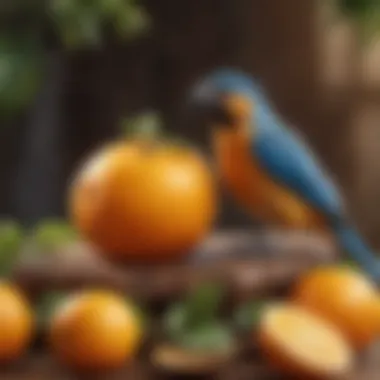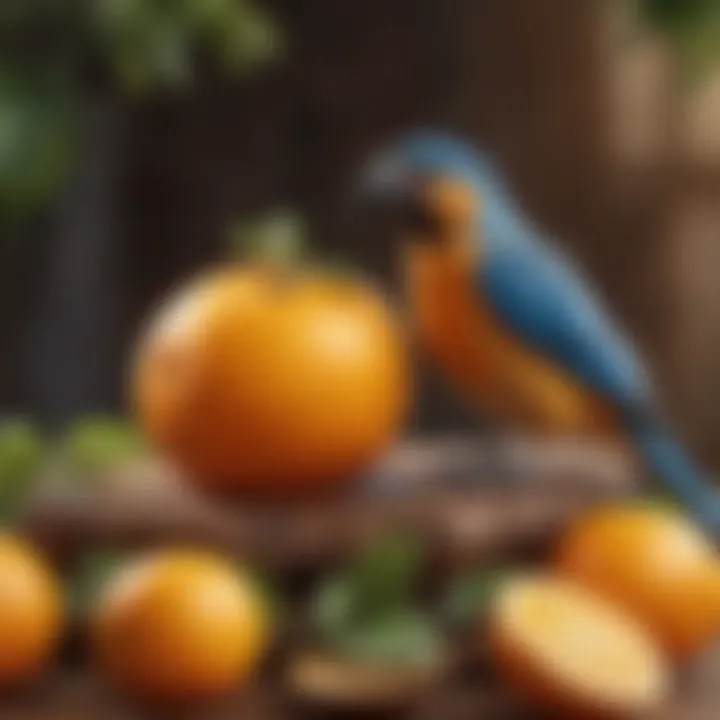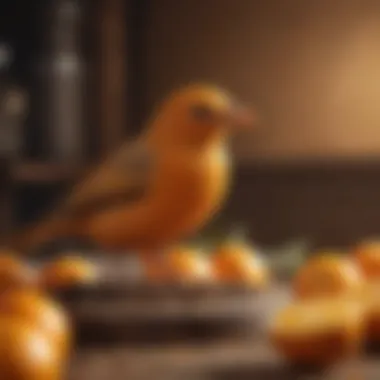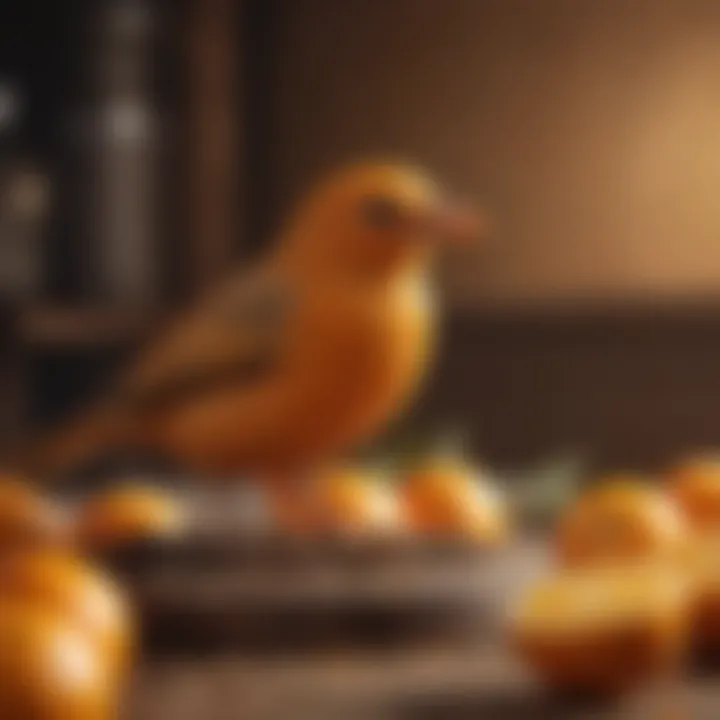Can Pet Birds Eat Oranges? Understanding Dietary Risks


Intro
Feeding pet birds requires knowledge about their unique dietary needs and preferences. One often-asked question among bird owners is whether oranges are safe for their pets. This inquiry is rooted in the desire to provide a balanced and enjoyable diet. Citrus fruits like oranges are popular among humans for their delicious taste and health benefits, but what about birds?
In this article, we will explore the nutritional value of oranges, potential risks, and how to appropriately incorporate this fruit into your pet bird's diet. A well-informed approach ensures that bird owners can make decisions that optimize the health and happiness of their feathered companions.
Care Tips
Daily Care Routines
To foster a healthy environment, pet owners must develop daily care routines. This includes regular feeding, ensuring fresh water is always available, and monitoring the bird’s behavior. Each species of bird may have different dietary needs, and it's crucial to observe their specific reactions to new foods like oranges.
Cage Setup and Maintenance
Proper cage setup significantly impacts a bird's well-being. The cage should be spacious enough for the bird to move freely, and the placement of food and water should promote accessibility. Regular cleaning of the cage is essential to prevent the buildup of bacteria, especially when fresh foods are introduced.
Hygiene and Cleaning Practices
Maintaining cleanliness is vital when it comes to a bird's environment. Surfaces should be sanitized with bird-safe cleaners. Pay attention to food remnants that can attract pests and cause illness.
Seasonal Care Adjustments
Birds experience changes in behavior and health needs with the seasons. For instance, during colder months, they may require extra warmth, while in hotter months, hydration becomes more crucial. Adjusting care routines to reflect seasonal changes is beneficial for maintaining overall health.
Behavioral Insights
Understanding Bird Body Language
Recognizing body language is essential for bird owners. Birds communicate their feelings through various physical signals. For example, a puffed-up bird may show discomfort or fear. Observing these signs allows owners to respond effectively to their pets' needs.
Common Behavioral Issues and Solutions
Behavioral problems like excessive screaming or feather plucking can arise from stress, boredom, or health issues. Identifying the root cause is the first step to finding solutions. Consistent interaction and stimulating environments can help mitigate these concerns.
Positive Reinforcement Techniques
Using positive reinforcement is an effective training method. Rewarding birds with treats, like small pieces of orange, can build trust and encourage desired behaviors. Good habits can further enhance ownership experiences.
Social Interaction Needs
Birds are social creatures; they require interaction with their owners or other birds. Social isolation can lead to mental challenges, so regular quality time is crucial. Incorporating activities such as talking or playing can enrich their lives.
Nutrition Guides
Essential Diet Components
A balanced diet for birds consists of seeds, pellets, fruits, vegetables, and occasional nuts. Oranges can add variety and essential vitamins, especially vitamin C. However, moderation is key; too much citrus can lead to digestive issues.
Safe and Toxic Foods
Understanding safe versus toxic foods is fundamental for bird health. While oranges are generally safe, some foods, such as chocolate and avocados, are harmful. Always research before trying new ingredients.
Supplements and Treats
In addition to natural foods, supplements may be necessary to fill dietary gaps. Discussing any supplement plans with a veterinarian ensures they meet the specific health requirements of your bird.
Feeding Strategies for Different Species
Different species have varying dietary needs. Budgerigars, for example, might enjoy pellets with some fruit, while larger parrots may require more extensive diets. Tailoring feeding strategies to species-specific needs maximizes nutritional intake.
Wellness and Health
Routine Health Checkups
Regular veterinary visits are crucial for early disease detection. These checkups can help ensure that your pet bird maintains optimal health. Annual exams can often catch issues before they escalate.
Identifying Symptoms of Illness


Owners should be vigilant about recognizing signs of illness. Changes in feeding habits, lethargy, or unusual droppings can signal health problems. Prompt attention to these signs can lead to quicker recovery.
Preventative Care and Vaccinations
Vaccinations and preventative care significantly reduce the risk of disease. Discuss vaccination options with a vet to protect your bird from common health threats.
Mental and Emotional Well-being
Birds require mental stimulation to thrive. Engaging them with toys and activities can help maintain their happiness and emotional health, reducing anxiety and stress levels.
Enriching Activities
Toys and Playtime Ideas
Investing in various toys that stimulate physical and mental activity is beneficial. Interactive toys can keep birds entertained and engaged, promoting a healthy lifestyle.
Training and Tricks
Training often strengthens the bond between birds and owners. Simple tricks can be taught using rewards. This not only provides mental stimulation but also fosters a sense of achievement in the bird.
Outdoor Activities and Interaction
Supervised outdoor time can offer birds fresh air and new sights. Using harnesses and proper precautions can allow positive exploration experiences while ensuring safety.
DIY Projects for Mental Stimulation
Crafting your own toys can engage the creative side of bird ownership. Simple projects using safe materials can provide endless entertainment for birds, keeping their minds active.
In summary, feeding pet birds like oranges can be safe and beneficial, but it requires careful consideration of their overall diet and behavioral needs. With proper attention to these areas, owners can keep their birds healthy and happy.
Prelude to Bird Nutrition
Nutrition for pet birds is a critical aspect in maintaining their health and longevity. Pet owners often overlook this topic, leading to confusion about what constitutes a balanced diet. Carefully examining the dietary needs of birds can help owners provide optimal care, fostering overall well-being and vitality in their avian companions.
Understanding avian nutrition involves acknowledging that birds require a variety of foods to meet their specific metabolic needs. This article does not solely focus on one type of fruit, like oranges, but also explores the broader implications of avian diets. The inclusion of fruits can be beneficial, yet it is essential to know how and when to introduce them into a bird's diet.
The Importance of a Balanced Diet
A balanced diet for birds comprises seeds, fruits, vegetables, and grains. Each of these components plays a distinctive role in avian health. For instance, seeds may provide critical fats, while fruits like oranges can introduce vitamins and hydration. Ignoring any food group can lead to deficiencies, which might manifest as behavioral changes or health complications.
Pet birds often thrive on a diet that balances macronutrients and micronutrients. It is also vital to adapt their diet according to their species, size, and activity levels. For caregivers wishing to enhance their birds’ diets, it is advisable to incorporate a diverse array of foods that meet their nutritional needs.
Understanding Avian Digestion
Bird digestion is distinctly different from mammalian digestion. Birds possess a unique digestive system, featuring a crop, proventriculus, and gizzard that work together to process food effectively. This specialized system allows birds to efficiently extract nutrients from various foods.
When considering the introduction of oranges into their diet, it is crucial to realize that the high acidity can impact digestion. Care should be taken to monitor how each bird responds after consuming citrus fruits. The overall health of the bird might be affected by how well its digestive system can handle new food types. Observations made during feeding can provide vital insights into how best to proceed.
Adapting a bird's diet requires ongoing attention to how well they are thriving on their current feeding regimen.
Choosing to add oranges introduces new variables linked to a bird's health and happiness. Therefore, being informed about avian digestion is imperative when it comes to making dietary changes.
Overview of Oranges
The discussion about oranges in relation to pet birds encompasses various critical aspects, including their nutritional value, unique characteristics, and their overall role in a bird's diet. Oranges, as a citrus fruit, offer a range of vitamins and minerals essential for supporting the health of pet birds. However, understanding these aspects is vital to determining whether they can be a beneficial addition to their diet.
Nutritional Composition of Oranges
Vitamins and Minerals
Vitamins and minerals play an important role in avian health. Oranges are particularly high in Vitamin C, which is crucial for supporting the immune system of birds. The presence of potassium contributes to maintaining healthy cellular function and proper muscle function. Moreover, calcium can be found in smaller portions, aiding in bone health. Birds, especially young or breeding ones, can benefit greatly from these nutrients. Thus, oranges can serve as a good source of these vitamins and minerals for birds.
Key Point: Vitamin C from oranges helps boost the immune functions of birds, making it a popular choice among fruit recommendations.
Fiber Content
Fiber content is another significant aspect to consider when evaluating the provision of oranges to pet birds. Oranges contain dietary fiber, which aids in digestive health. Fiber encourages proper bowel movements and can help prevent obesity, a growing concern among pet birds. Additionally, fiber contributes to creating a feeling of fullness, which can help manage portion sizes in feeding practices. While fiber serves as a benefit, excessive intake needs to be monitored to ensure it doesn't interfere with nutrient absorption.


Natural Sugars
The natural sugars found in oranges, primarily fructose, are another factor to consider. These sugars provide a quick source of energy, making oranges a potentially refreshing treat for active birds. However, it is important to moderate the amount of sweet fruit given, as high sugar intake can lead to obesity and related health issues. The sweetness of oranges can appeal to many birds, but care must be taken to balance their diet with vegetables and grains to avoid excess sugar.
Citrus Family Characteristics
Citrus fruits, including oranges, belong to a larger family known for their tangy taste and juicy flesh. These characteristics can make them attractive to birds. However, not all birds respond the same way to citrus. Some birds may enjoy the acidity, while others may not. Observing pet birds' reactions to new foods is important; introducing oranges should be done gradually to identify individual preferences.
The presence of citric acid and the vibrant color of oranges may also play a role in attracting birds. However, potential acidity may cause digestive issues in some species, so careful monitoring of individual responses is critical.
Can Pet Birds Consume Oranges?
The question of whether pet birds can safely eat oranges is pertinent for bird owners who want to enrich their pets' diets. Oranges can offer some nutritional benefits, but considerations must be made based on the type of bird. Understanding how various species react to oranges is crucial for pet owners aiming to maintain a balanced diet for their feathered friends.
Species-Specific Responses
Parakeets
Parakeets are known for their vibrant colors and sociable nature. Their small size can make them appealing to many bird owners. When it comes to consuming oranges, parakeets often show enthusiasm for this fruit. The natural sweetness of oranges can attract their interest. However, it is vital for owners to limit the quantity due to the fruit's acidity, which can lead to digestive issues if fed excessively.
Unique to parakeets is their energetic disposition, which requires a varied diet. While oranges can contribute beneficial vitamins, such as Vitamin C, they should not form the primary part of their diet.
Cockatiels
Cockatiels, characterized by their crests and wide-ranging vocalizations, also enjoy fruits like oranges, but with caution. They can benefit from the hydration that oranges provide. Their unique physiology can handle some citrus in moderation. However, overindulgence can result in upset stomachs.
Cockatiels thrive on a mixed diet. Those who understand their dietary needs know that fruits, including oranges, should complement their main food. This approach promotes overall health without the risks associated with excessive fruit consumption.
Canaries
Canaries are smaller birds, known for their melodious singing. These birds tend to prefer softer textures, so oranges may not always be their favorite. On the other hand, the refreshing taste can occasionally tickle their palate. Eating oranges can increase their Vitamin C intake. However, canaries have a delicate digestion, and citrus fruits can sometimes lead to issues. Limited serving sizes are advisable, as canaries can be more sensitive to changes in their diet.
Well-balanced nutrition is essential for canaries, making it important for owners to focus on a variety of safe fruits rather than solely relying on citrus.
Amazon Parrots
Amazon Parrots are larger birds with strong personalities. They have diverse taste preferences and can readily accept oranges in their diet. The capacity of Amazon Parrots to handle citrus foods is generally higher compared to smaller birds. They can enjoy the flavor and health benefits that oranges offer. Their robust digestive systems can usually cope well with moderate amounts of oranges, making it a popular addition to their treat list.
It is pertinent, though, that owners ensure availability of other necessary nutrients. For Amazon Parrots, the inclusion of oranges should be seen as a supplementary treat rather than a staple.
Dietary Guidelines for Feeding Oranges
When feeding oranges to birds, it is best to follow some simple guidelines to ensure their health. Here are some recommendations:
- Preparation: Always wash oranges thoroughly to remove any pesticides or chemicals. Peeling the fruit can also help reduce exposure to potential toxins.
- Serving size: Limit serving sizes to small pieces. A slice or two is sufficient for smaller birds, while larger birds may handle more.
- Frequency: Oranges can be offered every few days, balancing them with other fruits and vegetables for a diverse diet.
By adhering to these guidelines, bird owners can safely include oranges in their pets’ diets, promoting their health while avoiding possible risks.
Potential Benefits of Oranges for Birds
Feeding pet birds fruits like oranges can provide several advantages that enhance their overall health. It is essential to recognize how different components of oranges can contribute positively to a bird's diet. By focusing on the nutritional aspects, we can help bird owners understand why oranges might be beneficial.
Boosting Vitamin Intake
Oranges are a well-known source of Vitamin C, which plays a critical role in avian health. Vitamin C is important for various biological functions, including immune system support. Pet birds, particularly species like Parakeets and Cockatiels, can benefit from increased Vitamin C because it can aid in reducing the risk of illnesses. Furthermore, Vitamin C promotes the absorption of iron, which is crucial for preventing anemia. To note, birds cannot produce Vitamin C on their own, making it vital to incorporate such fruits into their diets.
Hydration and Refreshment
Another significant benefit of oranges for pet birds is their high water content. Oranges are composed of about 86% water, which can be very helpful for hydration, especially in warmer climates. Adequate hydration is essential for all avian species, as it supports digestive functions and overall well-being. Plus, feeding oranges can be a refreshing treat that may appeal to a bird’s natural curiosity. Bird owners should consider offering small portions regularly to keep their pets hydrated and satisfied, especially during hotter months.
Potential Risks and Precautions
When considering whether to feed oranges to pet birds, understanding the potential risks and precautions is essential. Oranges, like any other food, can have both benefits and downsides. Bird owners must be aware of these aspects to ensure the health and safety of their pets. This section addresses two main risks: acidity and digestive issues, as well as potential chemical exposure from pesticides.
Acidity and Digestive Issues
Oranges are known for their citrus properties, which means they contain natural acids. This acidity can be problematic for some bird species. For instance, birds such as Amazon parrots may encounter digestive issues if they consume citrus fruits in excess. Common symptoms to watch for include diarrhea, vomiting, or discomfort.


In moderation, many birds can tolerate oranges. However, it's wise to introduce them to your bird's diet gradually. Monitoring your bird's reaction is key. If you observe any signs of distress or change in behavior, immediately cease feeding oranges. Consult your avian veterinarian for advice tailored to your specific pet.
Chemical Exposure from Pesticides
Another important consideration is the potential chemical exposure from pesticides. Commercially grown oranges often undergo treatment with various chemicals to prevent pests and enhance shelf life. These substances can pose health risks to birds if ingested.
To minimize this risk, always wash oranges thoroughly before offering them to your pet. Peeling the orange can also help remove any pesticide residue. Additionally, consider sourcing organic oranges, as these tend to have fewer chemicals. By doing so, you can provide a safer feeding experience for your bird.
Overall, it is crucial to weigh the risks and benefits when introducing new foods into your pet bird's diet. Being informed empowers bird owners to make better choices for their avian companions.
How to Properly Prepare Oranges for Birds
Preparing oranges for your pet birds is crucial for ensuring their safety and health. Oranges can be a delightful treat, but improper preparation can lead to potential risks. Knowing how to clean, cut, and serve this fruit correctly is essential for maximizing benefits while minimizing dangers. Here, we will explore some vital practices for handling oranges before serving them to your feathered companions.
Washing and Peeling
Before offering oranges to birds, washing is an important first step. Store-bought oranges often come coated with pesticides and wax. These substances can be harmful to birds. Rinse the oranges thoroughly under running water to remove any residues. While washing may not eliminate all chemicals, it significantly reduces the potential for exposure.
After washing, it's advisable to peel the orange. The peel can contain higher concentrations of pesticides, and its tough texture may not be suitable for all bird species. Peeling off the skin makes the orange more palatable and easier for your pet bird to digest. Moreover, removing any seeds is essential since they can pose a choking hazard.
Here are simple steps for preparation:
- Rinse the orange under warm water.
- Use a knife or peeler to remove the skin.
- Cut the orange into appropriate-sized pieces.
Serving Sizes and Frequencies
When it comes to serving sizes and frequencies, moderation is key. While oranges provide benefits, they should not constitute the majority of a bird's diet. A small portion, about one or two segments, two to three times a week is often sufficient. This approach ensures that your bird enjoys the fruit without overindulging in sugars or acidity.
Consider monitoring your bird's reaction to oranges initially. Some birds may like the taste and enjoy the treat, while others might be indifferent. After introducing oranges, watch for any signs of digestive distress. If they occur, reduce or eliminate the fruit from their diet.
In summary, proper preparation is essential when feeding oranges to birds. By ensuring thorough washing and peeling, along with appropriate serving sizes, you can provide your flying friends with a tasty and nutritious addition to their diet.
Alternative Fruits for Pet Birds
Providing a variety of fruits in the diets of pet birds is essential. This not only aids in ensuring balanced nutrition but also keeps birds engaged and satisfied. Oranges, although beneficial, are just one part of the broader spectrum of fruits that can enhance a bird's well-being. This section discusses some alternative fruits that bird owners can consider incorporating into their pets' diets. Each fruit has unique properties that make it suitable for certain species of birds.
Safe Fruits to Consider
Berries
Berries are generally small, vibrant, and fundamentally nutrient-rich fruits. With options such as blueberries, strawberries, and raspberries, they provide an excellent source of antioxidants. This makes them particularly attractive for maintaining the health of pet birds. Their high water content helps keep birds hydrated, which is especially important in warm climates or during the summer months.
One unique feature of berries is their natural sweetness combined with low calorie levels. Many species, including parakeets and cockatiels, often enjoy the taste and will readily eat them. However, one should wash berries thoroughly to remove any pesticides before offering them to pet birds.
Apples
Apples are another widely accepted choice for pet birds. They come in different varieties, each offering a slight variation in taste and nutrition. Particularly, apples are a significant source of vitamin C and dietary fiber, both vital for the health of birds.
The key characteristic of apples is their crisp texture, which many birds enjoy. However, it is crucial to remove the seeds, as they contain cyanide and can pose a danger. Overall, apples serve as a versatile and healthy fruit option that can be enjoyed regularly by various bird species.
Pears
Pears are a gentle and sweet alternative to the other fruits listed. They offer a softer texture and are often well-received by pet birds. Pears are rich in water, aiding hydration as well. Their sweetness makes them a favorite among smaller birds.
One of the crucial aspects of pears is their high fiber content, promoting healthy digestion in birds. However, similar to apples, it’s important to core them to remove any potential seeds. Their soft flesh makes them an ideal fruit for younger birds or those that may have difficulty with harder options.
Incorporating Variety in Bird Diets
To ensure optimal health, it is advisable to offer birds a change in their diet regularly. Variety prevents boredom and allows the bird to receive a range of nutrients. Fruits like oranges, berries, apples, and pears can be rotated in and out of feeding schedules.
End
In this article, the discussion on the suitability of oranges for pet birds emphasized the intricacies involved in avian dietary needs. The exploration provided a thorough insight into the potential health benefits while also considering the risks associated with citrus consumption.
Summary of Key Points
- Nutritional Benefits: Oranges are rich in Vitamin C, essential for boosting the immune systems of birds. They also offer hydration, which is crucial for their overall health.
- Species Consideration: Different species react differently to oranges. While some birds may enjoy them without issues, others may experience digestive disturbances due to their acidity.
- Preparation and Serving: Proper preparation is key. Washing and peeling oranges before serving can reduce risks. Suitable serving sizes should be determined to avoid excess acidity.
- Alternatives: It's important to incorporate a variety of fruits such as berries, apples, and pears to ensure balanced nutrition.
- Risks of Chemical Exposure: Pesticide residues on fruits can pose serious health risks, necessitating thorough washing or sourcing organic options.
Final Recommendations for Bird Owners
For bird owners, the following recommendations should guide their decisions on oranges:
- Moderation is Key: Introduce oranges gradually and monitor for any adverse reactions.
- Focus on Freshness: Always select fresh, organic oranges to minimize pesticide risks.
- Observe Individual Preferences: Each bird is unique. Observe how your pet responds to oranges and adjust accordingly.
- Consult a Veterinarian: For specific dietary concerns or unusual behavior after feeding oranges, consultation with an avian vet is wise.
By integrating these insights, pet bird owners can make informed dietary choices, promoting vibrant health and longevity for their avian companions.















